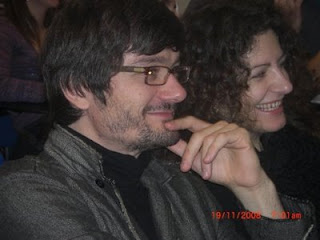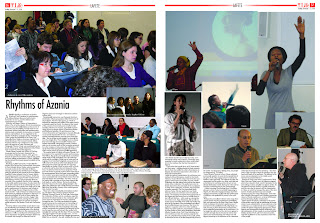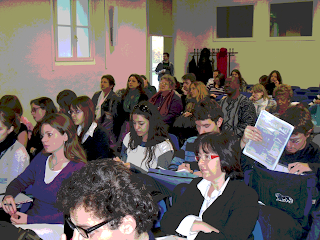
In the ambience of the Azania Speaks conference that held November 17-19, the tall, gangling fellow with glasses firmly planted on his Hollywoodite face looked like just another character on the campus of the University of Udine; perhaps a student or a teacher in the school that was playing host to the conference on Spoken Word and Oral Literature in post-colonial Africa. However, many of the participants who could or must have given him such an inaccurate identity, had already encountered his work without putting the lean frame behind such a monumental piece. No one could have walked through the passage of the campus at Sala Conveni di Palazzo Antonini via Petracco 8 in the heart of Udine into the hall where the talking sessions held without encountering the work of Alfredo Bini.
It was a video cum slide show installation mounted in the passage, and which welcomed everyone to the arena of the conference. Frame after frame of deeply affective images streamed out of the TV screens signifying the artist’s recording of the tragedy that water politics has visited on the people in the Sahel landscape of Africa, particularly in Burkina Faso. The collection, which he recorded when he accompanied an ngo on a mission to the Burkina Faso chunk of he Sahel region, was presented under the theme Water and land in Sahel, the case of Burkina Faso.
Bini’s images are fascinating in the photographer’s choice of angle, in such a way that an otherwise innocuous scene is transformed into almost live rendition because of his point of emphasis. In every frame there is a dominant figure that foregrounds the tragic mood of the landscape. The artist also explore the relationship between light and shadow to create contrast and strike emphasis. The technique is so effective that the viewer is compelled to thus empathise with the artist’s POV by just gazing at the huge figure that often seems to dwarf other features in the frame, and by simply tracing the movement of the shade in the frame. The images signify the failure of critical thinking of African political elites as well as the rape and plunder that colonial powers or the so-called industrialised nations continue to visit on hapless continent and its helpless critical mass.
Even years after he undertook the journey that recorded the collection, Bini still spoke passionately about his experience. He said he could still not overcome the shock he had when he encountered the magnitude of poverty that the selfish, conniving political leaders of most African countries have put their people. “These people did not use their land to produce food, which they need, they sold the land to multinationals who use the land to produce sugarcane which cannot feed the people, and which they export to Europe with the people the owners of the land as the workers who earn small money per day. They have become tenants on their own land, and they have allowed foreigners to take over the land, who then employ them! They do not even have water, because they have given out the land”, he said over lunch in the course of the conference.
Here is Alfredo Bini’s full explanation of his project:
After president Sankara’s death and after the European interference reaffirmed, water and land are still two valuable resources for daily life. The uninterrupted exploitation carried out by multinationals is only making the problem worse.
Burkina Faso is a country located in Sahel area, a stripe of land in Africa between the Sahara and the tropical moist region – a boundary zone between two contrasting bio climate areas, marked out by a half-arid landscape. The meaning of the word Sahel, from Arabic ???? sahil, shore, border of the Sahara desert, is in fact side of the desert. For millenniums this territory has been affected by the climate. Rainy and arid periods shape the environment and condition its inhabitants, who today and in the past as well, have always been looking for the two most important resources for life: water and land. Agriculture and sheep farming, so the survival of entire villages, depend on the availability of these two elements.
In Sahel people are used to depend on out-of-control events and they developed during the times a great spirit of adaptability. People are shaped by the land and by the conditions they are living in. The more such elements are difficult, the more they develop a sort of meekness and respect toward what surrounds them. In Burkina Faso more than the half of the people is animist, following the ancient beliefs that natural element have a soul. Earth is considered as a god. In fact during sowing time propitiatory rites are dedicated to it and carried out with sorghum beer in order to get its benevolence. Fields, crops, cattle, people, everybody and everything depend on earth’s capacity to distribute wealth such as cereals, grazing lands, fruits. This is the reason why men try not to alienate its spirit. Rains, alternating with sun, perform their precious task and give the land water – indispensable element in order to keep the vegetative cycle. Water too is an element bound to popular beliefs and its eventual plenty or shortage is connected to the behaviour of the people all the year long. Crimes, offences, homicides are often seen as causes of scarce or late rains. The controversial political facts happened in Burkina Faso are often considered having a bad influence on rain time.

. Alfredo Bini and a friend at the Azania Speaks
The Sahel and, more in detail, Burkina Faso, became famous at the beginning of the ‘70s when a rainfall lower than 75% of the still lacking local rain average caused a drought that had impressive repercussion on people’s life: inadequate yield of agriculture and disappearance of grazing lands with the following death of 70 – 80% of oxen. The faming in Sahel caused the death of one million people and at least 50 million people suffered heavy food shortage.
Burkina Faso was one of the most damaged countries. In 2005 and 2006 some events made believe a severe famine could occur again and also in this case some unfavourable conditions found their origin both in natural and human causes. In the whole area it has been scarce rainfalls for years, the consequence was lower crops yield and a following higher consumption of the limited food stocks. An invasion of locusts concentrated in Niger made the situation more and more critical endangering an area tried by scarce crops of the previous years. It was told that in Burkina Faso 80% of the population could hardly find sufficient food.
Such food crisis made again emerge one of the biggest problems of the Sahel’s countries, where the reduced availability of fertile lands magnifies the effect of the scarce rainfalls. The lack of growable land has not a natural cause only; it is also a consequence of the choices made by the colonial administration and later, because of the huge interests, kept by the most of government set up after independence.
In the past the growers grew thermophile cereals, such as millet and sorghum, that need little water. Together with rotation such cultures granted a good balance to the delicate land. During colonial period the most fertile lands were changed into plantations by the foreign companies that did not cultivate thermophile or xerophilous cultures, but they planted cotton and sugarcane, maize, peanuts – products for export that, besides impoverishing the land and bring to desertification in about thirty years, this is the case of cotton, they also lower the level of the underground water layers because they need a lot of water to grow.
It is easy to understand that the prevailing of this agricultural model, besides reducing the scarce cultivable lands, that in Burkina Faso are only a small part of the territory (14%), changed also the social structure of part of the population.
Today those who work in plantations earn from 0,4 to 0,7 ? /day – insufficient to grant an acceptable support and the purchase of indispensable articles. In some area before such economical model prevailed food provisions took place through barter that assure a minimal, but constant, production and spread of particular goods. Many growers after plantations were established could no more cultivate the best lands and moreover got an inadequate salary to support them, without goods to exchange and with a seriously compromised that does not allow even the cultivation of cereals needed for food.
At the moment this area of Africa has an underdeveloped agriculture, with a few means available, where the work is carried out almost exclusively manually on not much fertile lands, without the possibility to have sufficient food stocks. In such situation, as soon as unfavourable weather conditions reduce lands’ yield, food stock problems rise and many associations distributing help affirm that, in case of severe emergency, their efforts will not be sufficient to avoid famine, such as the one known in the 70s.
Thomas Sankara, during his premiership, tried to solve this situation. He tried to limit foreign companies’ influence in domestic politics trying to give farmers a more effective mentality for the management of their land. He was used to say “the land belongs to those who work it”. Further to this and other reforms Sankara was killed in 1987. In Burkina Faso everybody agree on saying the murder was supported by the French government and organised by Blaise Compaoré, Burkinabe president in charge. After Sankara’s death reformist activity regressed and nowadays, 20 years later, Burkina Faso meets again into the possibility of a catastrophic famine.
In this background during the years the interventions of humanitarian associations that realised development and help projects increased. The interventions were steered into children’s education, schools were built and teaching staff was trained and they tried to improve sanitary conditions thanks the opening of free drug dispensaries and sanitary education courses. In the same time professional training and local handicrafts production were supported and thanks to micro credit institution ethnic and local trade initiatives were born. The aim is to improve the quality of life of the people, making them financially self-sufficient and giving them cultural and social means allowing them to set themselves against the evil political choices of the government.
ALFREDO BINI
I was born in Pistoia, Tuscany, where I still live. I have always been attracted by the visual arts and their reproduction. I started off playing around with an old family Cannonet which I used on trips and holidays; as time passed, this passion developed, and with it came new commitments.
My first projects were based on landscape photography, which I gradually matched with travel and social report stories, which then became the principal focus of my work.
Initially I sought a faithful and descriptive representation of reality; later I began to create a more personal and interpretative vision of the subject, especially when I no longer feel the division between subject and myself, when the camera becomes a prosthesis of my body rather than an extraneous object I carry around with me. When this happens the subject perceives the sensation and becomes more spontaneous, taking no more notice of me.
I limit my equipment as far as possible in order to be as unobtrusive as possible; when I go on a shoot I take just one camera and a wide-angle lens. I make many of my landscape cuts with the tele, using the flash only as a filler, both in natural light and at night-time.
My work has been published in several European magazines and newspapers, displayed in Europe and in the United States, and are also shown at cultural events. In 2008, with a selection of images from my Burkina Faso project, I gained “Runner-Up” position in the “Travel Photo of the Year” competition, run in the UK by The Independent and Wanderlust Magazine. I won the Silver Award of Excellence in the “Biennial Juried Photography Show” held at the Edward Hopper House Museum on New York. I received the Bronze Award in the Orvieto Fotografia competition for the portrait and reportage categories. The “Water and Land in Sahel, the case of Burkina Faso” reportage gained second place in the International Photography Awards 2008 (NY) in the Editorial-Political category, and obtained two honorable mentions for the Environmental and Feature Story category, in the same contest.
I adore Asia, I find it a fantastic continent and an inexhaustible source of mental and photographic inspiration.
EniOlorutidakosefarawekosefenutembelekosebinukosena'kaiwosisiwiwolaawo



